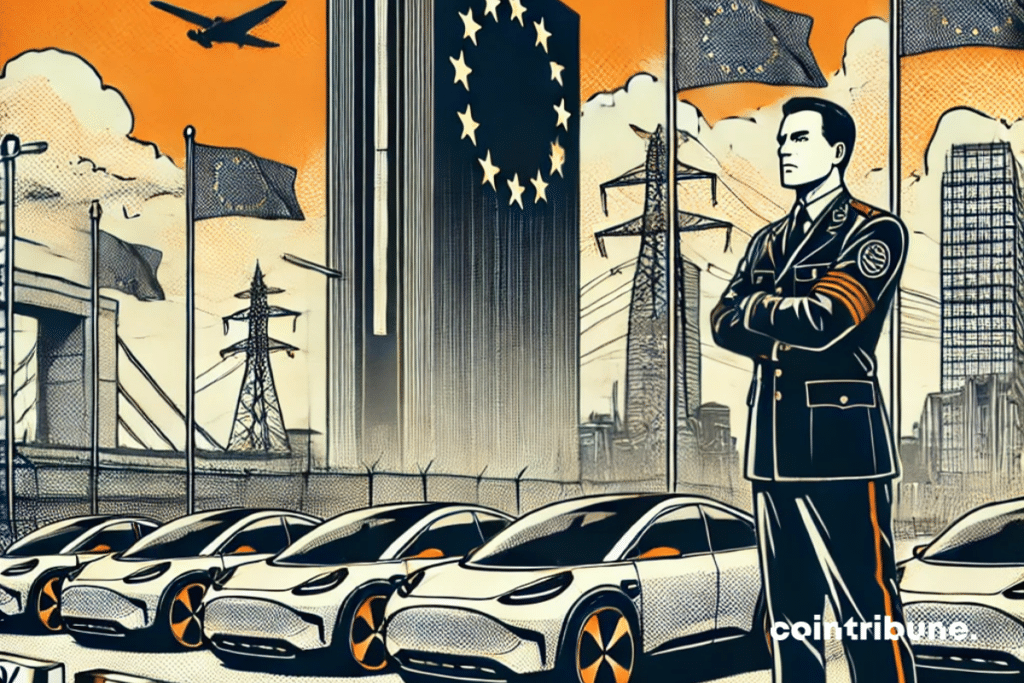Trade war : EU slaps new taxes on Chinese electric vehicles
On Tuesday, October 29, 2024, Brussels approved a drastic increase in customs taxes on electric vehicles imported from China. Such a measure follows an in-depth investigation into the massive subsidies granted by Beijing to its national manufacturers. For Europe, it’s a matter of industrial survival. While some applaud a necessary step to protect a struggling automotive market, others fear global economic repercussions.

The European Union strikes hard
The European Union has crossed a major threshold with the announcement of increased taxes on Chinese electric vehicles. This decision follows an investigation conducted over a year on the massive subsidies that Beijing grants its automakers. Thus, “The European Union is making a crucial decision for the protection and defense of our commercial interests, at a time when our automotive industry needs our support more than ever,” stated Antoine Armand, the French Minister of Economy and Finance. In addition to the standard 10 % tax applied to all imported vehicles, Brussels has imposed surcharges ranging from 7.8 % for Tesla to 35.3 % for the Chinese manufacturer SAIC.
This increase in customs duties comes at a time when European manufacturers are struggling to cope with the aggressive competition from Chinese manufacturers. Indeed, the latter, supported by significant subsidies, are able to offer electric models at prices well below those of their European counterparts. For Europe, this decision is therefore seen as a necessity to protect its national companies, despite the risks of trade retaliation from China. The surcharges are expected to take effect immediately after their publication in the EU Official Journal.
A controversial decision that could trigger a trade crisis
While some view this measure as a bulwark against unfair competition, others, like the German automotive industry lobby VDA, fear an escalation of trade tensions. “These customs duties are a step back for global free trade and therefore for prosperity, job retention, and Europe’s growth,” VDA declared in a statement. German manufacturers, already weakened by an internal crisis, believe these taxes risk leading to higher prices for consumers and jeopardizing the rise of electric vehicles in Europe.
This situation arises as Volkswagen, one of the giants of the automotive industry in Europe, is going through a difficult period, with forecasts of thousands of job cuts and the closure of several factories. The decision from Brussels, although understandable, could therefore worsen the situation for some key players in the sector. In the long term, this measure could lead to a large-scale trade conflict with China, which could slow down the adoption of electric vehicles in the EU. The challenge for Europe will be to find a balance between economic protection and support for the energy transition.
The EU’s decision to increase taxes on Chinese electric vehicles represents a decisive step in protecting its automotive industry. However, it comes with considerable risks, both for international trade relations and for the industry itself. Moreover, China could initiate retaliatory measures. While this measure aims to give a boost to European manufacturers, it could, paradoxically, delay the adoption of green technologies in a context where the energy transition is more necessary than ever.
Maximize your Cointribune experience with our "Read to Earn" program! For every article you read, earn points and access exclusive rewards. Sign up now and start earning benefits.
Diplômé de Sciences Po Toulouse et titulaire d'une certification consultant blockchain délivrée par Alyra, j'ai rejoint l'aventure Cointribune en 2019. Convaincu du potentiel de la blockchain pour transformer de nombreux secteurs de l'économie, j'ai pris l'engagement de sensibiliser et d'informer le grand public sur cet écosystème en constante évolution. Mon objectif est de permettre à chacun de mieux comprendre la blockchain et de saisir les opportunités qu'elle offre. Je m'efforce chaque jour de fournir une analyse objective de l'actualité, de décrypter les tendances du marché, de relayer les dernières innovations technologiques et de mettre en perspective les enjeux économiques et sociétaux de cette révolution en marche.
The views, thoughts, and opinions expressed in this article belong solely to the author, and should not be taken as investment advice. Do your own research before taking any investment decisions.